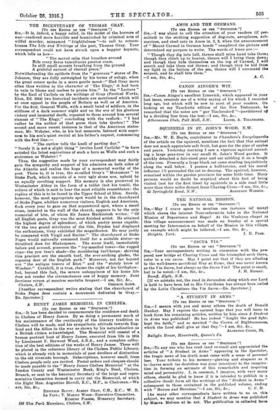THE BICENTENARY OF THOMAS GRAY. (To THE EDITOR OP TM
" SPECTATOR.")
is, indeed, a happy relief, in the midst of the horrors of war—rendered more horrible and besmirched by criminal acts of wilful murder, misnamed " frightfulness "—to call to remem- brance The Life and Writings of the poet, Thomas Gray. Your correspondent could not have struck upon a happier keynote, which tells us how- " The sacred calm that breathes around Bids every fierce tumultuous passion cease, In still small accents breathing from the ground A grateful earnest of eternal peace."
Notwithstanding the epithets from the " generous " stores of Dr. Johnson, they are fully outweighed by his terms of eulogy, when the great censor spoke in a more gentle mood—" Had Gray more often thus written in the character of ` The Elegy,' it had been in vain to blame and useless to praise him." In the "Lecture " by the Earl of Carlisle on the writings of Gray (Poetical Works, Eton, Ed. 1854) two historical incidents are mentioned which will at once appeal to the people of Britain as well as of America. For the first, General Wolfe, with a small band of soldiers, in the stillness of a dark summer night and on the eve of his glorious victory and immortal death, repeated to those around him several stanzas of " The Elegy," concluding with the remark : " I had rather be the author of that poem than take Quebec! " The second and more recent instance is that of the American states- man, Mr. Webster, who, in his last moments, listened with eager- ness to his son's quiet recital at his father's request, commencing with the first line:— " The curfew tolls the knell of parting day."
"Surely it is not a slight thing " (writes Lord Carlisle) " to have satisfied the latest aspirations of such a hero as Wolfe and such a statesman as Webster ! "
Thus, the suggestion made by your correspondent may fairly gain the sympathy and support of his admirers on both sides of the Atlantic and realize the hope of a memorial worthy of the poet. There is, it is true, the so-called Gray's " Monument " in Stoke Park, which consists of a very ugly stone urn, upheld by an equally revolting support. His memory is also preserved in Westminster Abbey in the form of a tablet (not his tomb), the relievo of which is said to bear the most reliable resemblance : the replica of this is to be found in the -Upper School at Eton. Surely, however, the most appropriate spot would be in the churchyard of Stoke Poges, whither numerous visitors, English and American, flock every year to gaze on that sequestered spot, where a small stone, inserted in the wall of the church, appears to be the only memorial of him, of whom Sir James Mackintosh writes: " Of all English poets, Gray was the most finished artist. He attained the highest degree of splendour, of which poetry seems capable. Of the two grand attributes of the Ode, Dryden had displayed the enthusiasm, Gray exhibited the magnificence. He may justly be compared with Virgil and Racine." The churchyard at Stoke Poges would naturally commend itself for a suitable statue—as Stratford does for Shakespeare. The scene itself, immediately before and around, possesses the " ivy-mantled tower—the rugged elms—the yew tree's shade—the mouldering turf-heaps: skirting this precinct are the smooth turf, the ever-arching glades, the reposing deer of the English park." Moreover, not far beyond aro " the antique towers of Eton " and the " stately brow of Windsor." Cornhill, it is true, claims the right of his birthplace : but, beyond this fact, the severe unhappiness of his home life does not render the circumstances one of happy memory. Sunt Iacrimae reruns at mentem mortalia tangunt.—I am, Sir, &c., Chelsea, S.W. OSBORNE ALDIS. [Another correspondent writes stating that the churchyard of Stoke Poges does contain a monument dedicated to Gray.— ED. Spectator.]


































 Previous page
Previous page